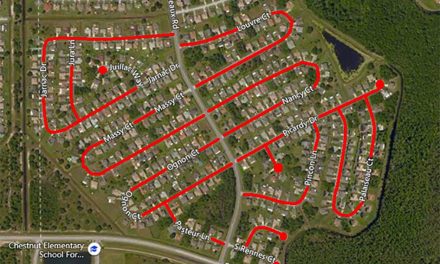During the 2022 Atlantic Hurricane Season we saw 14 named storms, eight became hurricanes , two intensifying to major hurricane status with winds reaching 111 mph or greater.
Hurricane Ian first made landfall as a Category 4 storm in Cayo Costa, Florida on Sept. 28, with maximum sustained winds of 150 mph and tied for the fifth strongest hurricane ever to make landfall in the United States. Hurricane Nicole made landfall near Vero Beach on Nov. 10th, devastating parts of Florida’s east coast and caused severe beach erosion, and extreme flooding. Nicole marked the third November Hurricane to strike Florida.
Fifty-five leaders from all over Osceola County traveled to Emmitsburg Maryland in March, after being selected to participate in the Integrated Emergency Management Course at the National Emergency Training Center that FEMA holds only 12 times during the year. The IEMC is a a four-day, exercise-based training activity for Emergency Operations Center personnel to practice simulated, but realistic, crisis situations, within a structured learning environment. Osceola County was the only Florida jurisdiction to be selected to participate this year, and hasn’t attended the training center since 2017. The emergency management course allowed leaders from all over Osceola County to participate in exercises that would prepare them for potential emergency situations that, as we have seen recently, can devastate our local community.
Those in attendance included members of the Osceola Office of Emergency Management, City of St. Cloud Mayor Nathan Blackwell, City of Kissimmee Mayor Olga Gonzalez, St. Cloud City Manager Veronica Miller, Kissimmee City Manager Mike Steigerwald and Deputy Manager Austin Blake, Maryemma Bachelder and Andrew Sullivan from St. Cloud’s Communications team, the Osceola Sheriff’s Office, Sue Ring from the Osceola Chamber, Kissimmee Fire Chief Jim Walls, Theresa Batchelder from the Osceola Council On Aging, St. Cloud Police Chief Doug Goerke, UCF Police Department’s Christine Mouton, Osceola County, Kelly Trace from Reach, St. Cloud Fire Chief Jason Miller, the lead investigator from the Osceola/Orange Counties Medical Examiner’s Office, Robert Rivera, and Will Ulrich, Warning Coordination Meteorologist with the National Weather Service in Melbourne.
“We’ve been faced with a little bit of everything over the last couple years, hurricanes, flooding, and also a pandemic, so we went back into our threat hazards assessment, and decided to go after tornados during the FEMA training exercise. Tornados are one of our worst case scenarios” Director of Osceola County’s Emergency Management Bill Litton said after returning from the IEMC.
During the training, the delegation went through a four-hour “mock exercise” that included two tornados striking Osceola County, one hitting St. Cloud first in the early hours of the morning, followed by a second tornado striking unincorporated areas of Osceola County and Kissimmee.
“The Integrated Emergency Management Course at the National Emergency Training Center was a great opportunity for members of the City’s team to train with partners from the city of Kissimmee, Osceola County and private agencies to help ensure we are prepared to respond to disasters such as tornadoes or hurricanes,” said St. Cloud City Manager Veronica Miller. “We were able to apply lessons learned last year through Hurricanes Ian and Nicole, and further refine our skills to help ensure that we all are prepared to respond appropriately in times of crisis. We are grateful to the County’s Emergency Management Director Bill Litton for making this opportunity available.”
Shortly after the 55 leaders returned home from the Integrated Emergency Management Course, severe tornados ravaged parts of Mississippi and Alabama, reinforcing the importance of the training the delegation received.
“To get back home, and get our feet back on the ground, and then that next day on Sunday seeing the devastation in Mississippi and Alabama, where a town was just knocked off the map by F4 tornados, really brought it to the forefront how important that week of training was for us,” Litton said. “Being able to get everyone together, building that teamwork and team bonding, I think that will be beneficial to the county and our residents moving forward.”
The 2023 Atlantic hurricane season runs from June 1st through November 30th. Take advantage of what Osceola County ‘s Director of Emergency Management Bill Litton calls “blue skies” time by beginning to prepare. Inspect your hurricane supples kit now. Here are some suggested items for the kit:
- Water (one gallon per person per day for several days, for drinking and sanitation)
- Food (at least a several-day supply of non-perishable food)
- Battery-powered or hand crank radio and a NOAA Weather Radio with tone alert
- Flashlight
- First aid kit
- Extra batteries
- Whistle (to signal for help)
- Dust mask (to help filter contaminated air)
- Plastic sheeting and duct tape (to shelter in place)
- Moist towelettes, garbage bags and plastic ties (for personal sanitation)
- Wrench or pliers (to turn off utilities)
- Manual can opener (for food)
- Cell phone with chargers and a backup battery
Receive alerts about emergencies and other important community news by signing up for Osceola County’s Emergency Alert Program.



















